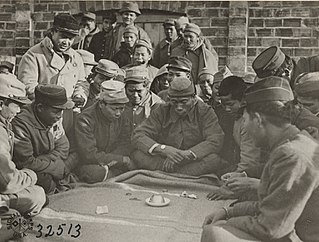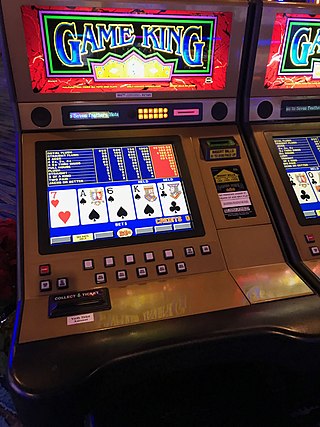Related Research Articles

Blackjack is a casino banking game. It is the most widely played casino banking game in the world. It uses decks of 52 cards and descends from a global family of casino banking games known as "twenty-one". This family of card games also includes the European games vingt-et-un and pontoon, and the Russian game Ochko. The game is a comparing card game where players compete against the dealer, rather than each other.

A casino is a facility for certain types of gambling. Casinos are often built near or combined with hotels, resorts, restaurants, retail shops, cruise ships, and other tourist attractions. Some casinos are also known for hosting live entertainment, such as stand-up comedy, concerts, and sports.

Games available in most casinos are commonly called casino games. In a casino game, the players gamble cash or casino chips on various possible random outcomes or combinations of outcomes. Casino games are also available in online casinos, where permitted by law. Casino games can also be played outside of casinos for entertainment purposes, like in parties or in school competitions, on machines that simulate gambling.

Craps is a dice game in which players bet on the outcomes of the roll of a pair of dice. Players can wager money against each other or against a bank. Because it requires little equipment, "street craps" can be played in informal settings. While shooting craps, players may use slang terminology to place bets and actions.

Chuck-a-luck, also known as birdcage, or sweat rag, is a game of chance played with three dice. It is derived from grand hazard and both can be considered a variant of sic bo, which is a popular casino game, although chuck-a-luck is more of a carnival game than a true casino game. The game is sometimes used as a fundraiser for charity.

Roulette is a casino game which was likely developed from the Italian game Biribi. In the game, a player may choose to place a bet on a single number, various groupings of numbers, the color red or black, whether the number is odd or even, or if the number is high or low.

A slot machine, fruit machine, poker machine or pokies is a gambling machine that creates a game of chance for its customers.

Video poker is a casino game based on five-card draw poker. It is played on a computerized console similar in size to a slot machine.

Gambling in Macau has been legal since the 1850s when the Portuguese government legalised the activity in the autonomous colony. Since then, Macau has become known worldwide as the "Gambling capital of the world". It is the only place in China where casino gambling is legal.
Online casinos, also known as virtual casinos or Internet casinos, are online versions of traditional casinos. Online casinos enable gamblers to play and wager on casino games through the Internet. It is a prolific form of online gambling.
Vigorish is the fee charged by a bookmaker for accepting a gambler's wager. In American English, it can also refer to the interest owed a loanshark in consideration for credit. The term came to English usage via Yiddish slang which was itself a loanword from Russian.
A progressive jackpot is a jackpot which increases each time the game is played but the jackpot is not won. When the progressive jackpot is won, the jackpot for the next play is reset to a predetermined value, and resumes increasing under the same rule.
A video lottery terminal (VLT), also sometimes known as a video gaming terminal (VGT), video slots, or the video lottery, is a type of electronic gambling machine. They are typically operated by a region's lottery, and situated at licensed establishments such as bars and restaurants.

A fixed odds betting terminal is a type of electronic slot machine normally found in betting shops in the United Kingdom and introduced in 1999. The terminals allow players to bet on the outcome of various games and events which have fixed odds, with the theoretical percentage return to player (RTP) displayed on the machine by law. Like all casino games, the "house" has a built-in advantage. Typically, slot machine FOBTs have an RTP of 90% to 94% depending on the chosen stake, and standard roulette FOBTs have a long-term average RTP of 97%.
The table limit is the minimum and maximum bet that a gambler can make at a gaming table. It is a form of yield management in that the limits can be changed to optimize the profit from a gaming table. Gaming tables have a limited resource to sell: the seats used by the players.
The mathematics of gambling is a collection of probability applications encountered in games of chance and can get included in game theory. From a mathematical point of view, the games of chance are experiments generating various types of aleatory events, and it is possible to calculate by using the properties of probability on a finite space of possibilities.
Advantage gambling, or advantage play, refers to legal methods used to gain an advantage while gambling, in contrast to cheating. The term usually refers to house-banked casino games, but can also refer to games played against other players, such as poker. Someone who practices advantage gambling is often referred to as an advantage player, or AP. Unlike cheating, which is by definition illegal, advantage play exploits innate characteristics of a particular game to give the player an advantage relative to the house or other players. While not illegal, advantage play may result in players being banned by certain casinos.

Comps are complimentary items and services given out by casinos to encourage players to gamble. The amount and quality of comps that a player is given usually depends on what games they play, how much they bet and how long they play.
Real Time Gaming (RTG) is an online casino company developing download-based casino software, licensed by various operators running their own branded RTG-powered casino sites. The company was established in Atlanta, Georgia in 1998, but moved all development to Heredia, Costa Rica in 2007-2008.

Slot machine terminology, characteristics and regulations vary around the world.
References
- ↑ Philip W.S. Newall, Lukasz Walasek, Elliot A. Ludvig, Matthew J. Rockloff. House-edge information yields lower subjective chances of winning than equivalent return-to-player percentages: New evidence from support forum participants
- ↑ Philip W. S. Newall, Lukasz Walasek, Elliot A. Ludvig. Equivalent gambling warning labels are perceived differently Archived 2021-12-24 at the Wayback Machine
- ↑ Debbie Collins, Sophie Green, Jo d’Ardenne, Heather Wardle & Shauna-Kaye Williams. Understanding of Return to Player messages: Findings from user testing (October 2014)
- ↑ Electronic gaming machines – return to player (RTP) policy Archived 2022-03-25 at the Wayback Machine // Department of Local Government, Sport and Cultural Industries, Government of Western Australia
- ↑ Newall, P.W.S., Byrne, C.A., Russell, A.M.T., & Rockloff, M.J. House-edge information and a volatility warning lead to reduced gambling expenditure: Potential improvements to return-to-player percentages
- ↑ Olha Lammer. Are Highest RTP Slots More Popular? Archived 2022-02-18 at the Wayback Machine
- ↑ "Return to Player (RTP) and Hit Frequency: What Do These Mean?". Archived from the original on 2022-05-26. Retrieved 2022-07-23.
- ↑ Online slots Return to Player (RTP) explained: Make sense of it and get the best value